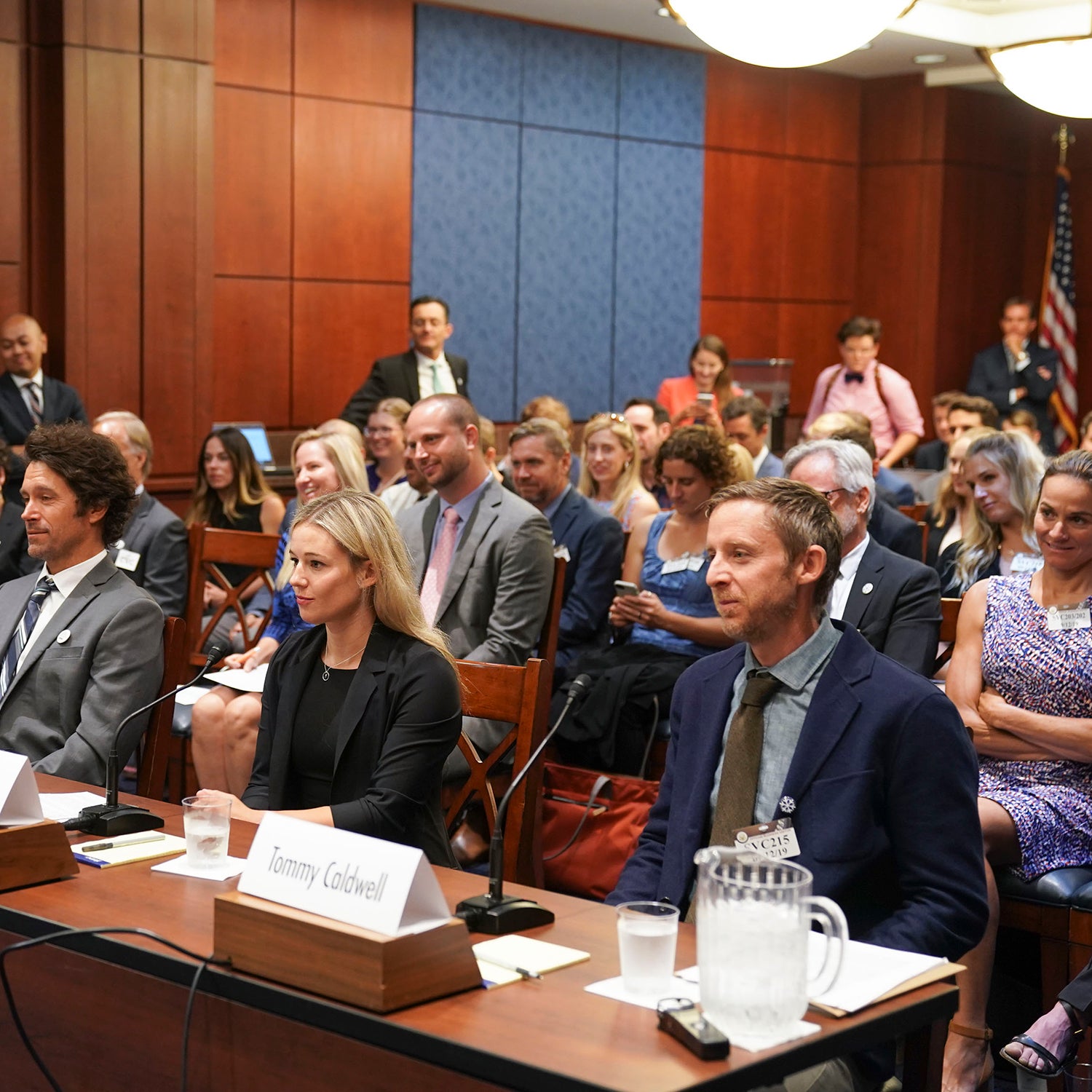Ski mountaineer Caroline Gleich says it felt like she’d run an ultramarathon. Her body was exhausted, her feet blistered and bruised. But she was far out of her home mountains, Utah’s Wasatch Range. Instead, she had spent the second week of September running around Capitol Hill, testifying before the Senate Democrats’ Special Committee on the Climate Crisis.
Gleich has been making yearly trips to Washington, D.C., since 2014, with the climate-advocacy nonprofit Protect Our Winters. This year, during a week of climate-related votes, 45 athletes and outdoor-brand representatives flew in from the mountains, swapped beanies for business suits, and channeled their endurance, adrenaline, and social-media skills into lobbying.
We are in contentious, divisive political times, and even though climate hasn’t always been a partisan issue, it has become so because of the of a relatively small number of wealthy climate deniers. POW is trying to use those same forces, but for good, by consolidating social capital.
Athletes were the original celebrity influencers, and in the age of a Tweeting president, they’re using that reach to underscore the economic power of the outdoor industry. They’re essentially calling bullshit on junk climate science, when and they’re trying to use their clout to garner broad support for the climate-friendly policy they say is crucial for their livelihood on rock, snow, and ice. “There’s a misconception of lobbying, that it’s shady work,” Gleich says. “It’s not, but democracy doesn’t work if you don’t show up.”
This year the athletes were advocating on behalf of the Arctic Cultural and Coastal Plain Protection Act, which passed the House while they were there, and the , which would protect 400,000 acres of Colorado public lands. At the Senate hearing, four activists—Gleich, climber Tommy Caldwell, former New York Rangers goalie and president of Brightcore Energy Mike Richter, and POW’s founder, snowboarder Jeremy Jones—testified on both the concrete changes they’ve seen in the mountains and the direct economic impact.
“Conditions are changing for the worse,” Gleich, who summited Mount Everest in May, told the assembled senators. “Climate change is making climbing and ski mountaineering more dangerous.” This year’s congestion on Everest, she testified, was caused in part by a shifting jet stream that shortened the summit window for climbers from seven to ten days down to two. “By the end of the stretch, 11 climbers lost their lives,” she said.
Jones took on the larger economic picture. The outdoor industry is “70,000 more jobs than the extractive industry,” he told Democrats. “We represent a huge audience, and they want action. This is an 18-to-35-year-old group that hasn’t been traditionally active, but they really care about this.”
As Jones told the lawmakers, he didn’t envision Protect Our Winters as a D.C. lobbying group. He started POW in 2007 to educate and advocate about climate change, pulling in a coalition of athletes who visited schools to talk about the climate and Instagrammed about shrinking snowpack. POW athletes sent letters to Obam˛ąĚýand recruited scientists to report on the future of winter.
But as a 501(c)3 nonprofit, the organization can’t do electoral work or endorse specific candidates. So in the lead-up to the 2018 midterms, it started the POW Action Fund, which has ˛ąĚý501(c)4 designation. “It’s an independent entity, with its own mandate and mission statement—to elect climate champions into office and hold them accountable,” says POW’s executive director, Mario Molina. Climate change has become to voters, Molina notes, and politicians are trying to figure out their positions. “They’re seeing the polls are changing, science is there, and they’re hearing from constituents, including us, that there’s changes on the ground.”
This year marked the best reception POW activists have had on Capitol Hill. Instead of meeting with congressional staffers, as they had in years past, the activists got time with senators and representatives—including 19 members of Congress they’d never met with before. “I got the sense that Republicans realize the issue is something a lot of Americans care about, and they don’t want to be left out of the conversation,” says splitboarder Josh Jespersen.
Their strategy on the Hill is two-pronged: emotion and economics. “It has to be a combo,” Molina says. “Our athletes tell stories of what they’re actually seeing and what it means to them, whether it’s the loss of training grounds for Olympians or a shortened window on Everest. That stuff is great, but we also have a strong economic argument.” So business leaders like David Perry, the COO and president of Alterra, address the impacts of shorter ski seasons on the resort industry.
It’s a strong case. A September report from the found that, in 2017, the outdoor recreation industry grew at a rate of 3.9 percent (compared to an overall national rate of 2.4 percent), injecting more money into the economy than either mining or agriculture.
New Mexico senator Martin Heinrich, who was at the committee hearing, says the POW athletes’ personal stories made for compelling testimony but that their economic argument carries political force, especially in climatically sensitive states like his, where recreation is a big piece of the economy. “With politics you always have inertia, and in terms of raw jobs, the outdoor industry is enormous in the West today,” he says. “You can’t ignore them anymore. Look at the Outdoor Retailer show leaving Utah, where both the federal delegation and the governor’s office are outwardly hostile to public lands. The outdoor industry as a whole is just realizing that having this economic piece has both power and responsibility, and I think it’s figuring out how to use those things.”
On the right side of the aisle, that inertia is giving way. Gleich and other Utah residents met with Republican Utah congressman John Curtis, who has said he believes climate change is , and who has introduced . It’s the first time, Gleich said, that they’ve been able to have climate conversations with someone in his role.
There’s still a long way to go, we’re still at loggerheads, but the conversation is changing. “The rhetoric coming out of, say, Mitt Romney’s office is encouraging,” says Molina. “They acknowledge that climate change is a problem, and that it’s human caused, but they’re still in the information-gathering phase. I just hope they’re not in this information-gathering phase for too long.”
Like any celebrities, our favorite outdoor athletes have the power to push trends—even Senator Heinrich admits to being a little starstruck by Tommy Caldwell. And that might be POW’s biggest strength. It’s the thing Jones has been trying to capture from the start, and what the Action Fund is leveraging.
, and in the same way that athletes can be physical role models, they can be political ones, too. What they’re doing on a national stage can happen locally. I’m not going to free-solo El Cap, for instance, but I can tentatively clip bolts at a crag 30 minutes from my house. Likewise, I may not be testifying to a Senate committee, but I can speak up loudly back home.
“People thank us, but don’t thank us—go to your city-council meeting,” Gleich says. “At every level, the government works for us, but we need to be telling them what to do.”


